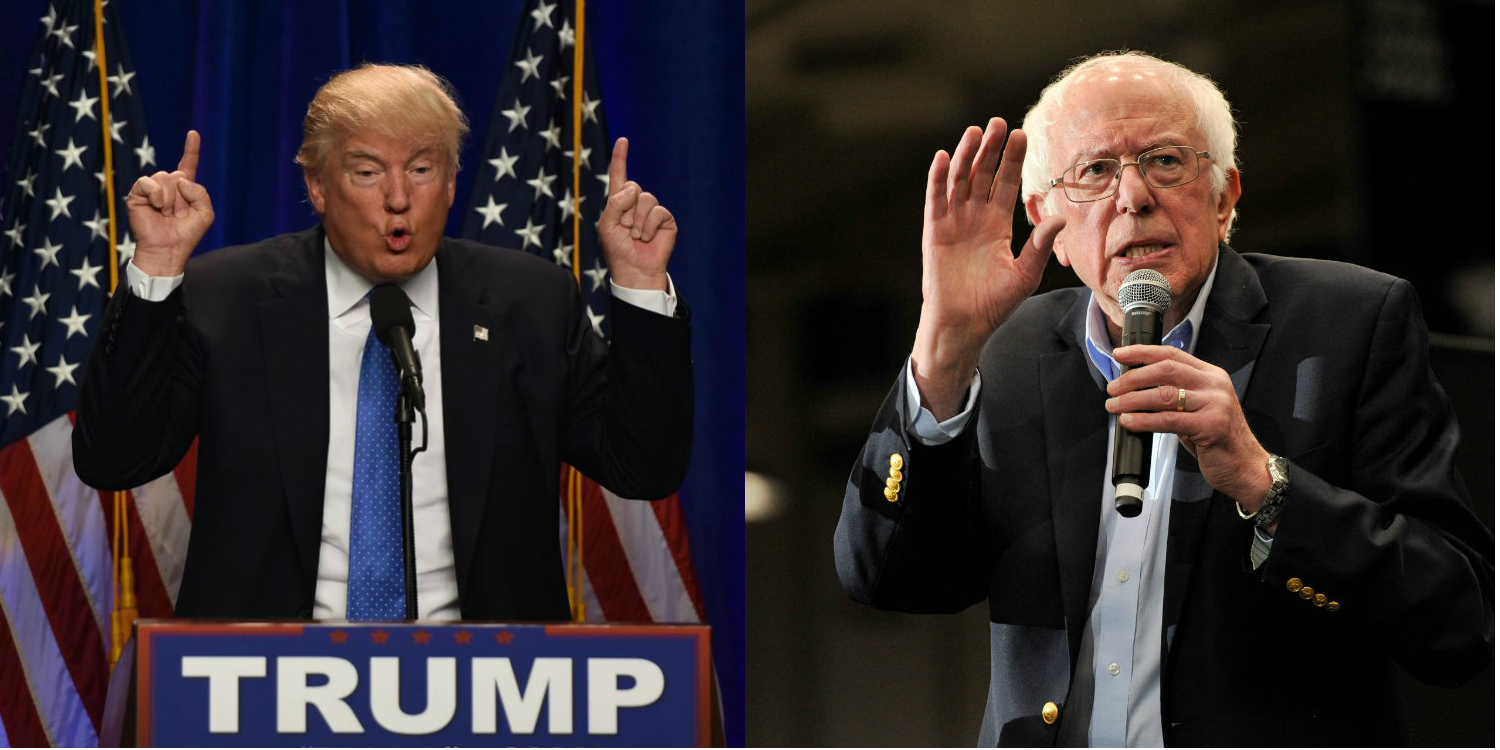Donald Trump vs. Bernie Sanders: What an extreme match-up would reveal about American politics
They represent their parties' respective ids, giving voters an unfiltered look at what they're getting


Everyone knows that by far the most likely outcome of the 2016 primary season is a general election contest pitting Hillary Clinton against Jeb Bush, Marco Rubio, or Scott Walker. Those are the candidates with the potentially broadest mainstream appeal, and that's who usually prevails in the primaries.
Yet it's also true that, tracking with growing ideological polarization in the country at large, both parties are pulling away from the center. The GOP's lurch to the right began with the rise of the Tea Party early in Barack Obama's first term, while the newly energized left has increased its influence in the Democratic Party since Barack Obama's re-election. The result is a solid 14 percent for Bernie Sanders among Democrats and 13 percent for Donald Trump among Republicans.
With an additional 20-something percent of Republicans dividing their support among Ben Carson, Mike Huckabee, Ted Cruz, and Rick Santorum, the GOP appears to have far more extremists than the Democrats. But let's not focus on quantity. What we need is a qualitative comparison between the leading unelectable radicals.
The Week
Escape your echo chamber. Get the facts behind the news, plus analysis from multiple perspectives.

Sign up for The Week's Free Newsletters
From our morning news briefing to a weekly Good News Newsletter, get the best of The Week delivered directly to your inbox.
From our morning news briefing to a weekly Good News Newsletter, get the best of The Week delivered directly to your inbox.
Neither Trump nor Sanders is going to be president. But imagining a contest or choice between them promises to be a supremely useful exercise, granting us a glimpse of the distilled essence of each party. What does it sound like when each party's character and convictions — its fondest hopes and dreams for the country — are expressed with absolute clarity and purity, and without regard for pragmatism or compromise, or any consideration for broader appeal? Trump and Sanders make such a comparison possible.
Let's start with the biographies.
Sanders is a lifelong democratic socialist specializing in class-based appeals, an idealist who began as an activist and agitator but eventually put his left-wing ideals to the practical, political test. He did hard work from the bottom up, repeatedly running in and losing low-level contests before finally becoming the mayor of Burlington, Vermont, and then slowly clawing his way up from there to the House of Representative and then finally to the U.S. Senate.
Trump, meanwhile, inherited something between $40 million and $200 million from his father, used it to become a real estate mogul in a city (New York) where values have gone sky-high for everyone, filed for corporate bankruptcy four times in order to insulate himself from the consequences of bad investments, and ended up with a few billion dollars to his name. Oh, and he's never been elected to a political office of any kind.
A free daily email with the biggest news stories of the day – and the best features from TheWeek.com
When it comes to personal style, the contrast might be even starker.
Sanders shows little interest in tailoring his message to woo the masses. He says what he believes and lives with the consequences. This makes him seem far more honest and sincere than your average politician, but also more earnest, moralistic, and self-righteous. He doesn't appear to value compromise very highly — or to admire modesty and caution. Like many former activists, he seems to pine for a politics of mass mobilization, and to dream of standing at the head of a grassroots movement for High Ideals.
Trump is no slouch in the immodesty department either, and he also longs to lead a grassroots movement, though High Ideals have nothing at all to do with it. More than anything he wants attention and power for himself, and if flattering the prejudices of angry Know Nothings will get them for him, he's more than happy to oblige. This makes him seem even more dishonest and insincere than most politicians — and even more prone to shift positions for the sake of political gain. I have no idea what the man really believes, and neither do you. He's all surface, all the way down.
As one would expect, it's on policy that the differences between the candidates are most sharply pronounced.
Sanders is every Republican's fever dream of a Democrat (even though he's been an independent for most of his career). Whereas most Democrats of national ambition are pragmatists who propose a mix of government-focused and market-based solutions to the country's problems, Sanders appears to adore government and positively loathe the market. He wants to spend a trillion dollars on infrastructure alone. (No word on how we might begin to pay for it.) Then there's free college tuition for all, and a single-payer health care proposal paid for in large part by a massive new income tax imposed on every person who earns more than $600,000 a year.
Trump, by contrast, is well within the Republican mainstream on most issues, supporting deep tax cuts, opposing abortion and same-sex marriage, and favoring a foreign policy that's rooted in fantasies of American omnipotence and specializes in empty threats and noisy bluster.
The big exception, of course, is immigration, where Trump has outflanked even the harshest restrictionists in the race by portraying Latin American immigrants as violent criminals out to commit rape and murder while also stealing American jobs. Never mind that there's little evidence that such immigrants are more prone to crime than Americans as a whole — or that immigrants only come to this country in such large numbers because countless individuals and businesses are willing to hire them in defiance of the law. Such subtleties will never trouble the mind of a demagogue or the people he aims to manipulate for personal gain.
And that brings us to the final point of contrast for any radical's political program: objects of demonization.
Sanders demonizes Big Business, Wall Street investment bankers, and the super-rich — in a word, the wealthiest, most powerful people in the country.
Trump demonizes immigrants who come to this country for a better life — in a word, the poorest, least powerful people in the country.
It should be obvious that neither Sanders nor Trump is my kind of politician. (My instincts lie in the center of the political spectrum, with my preferences leaning to the left on some issues and to the right on others.) Yet if I had to choose, there'd be no contest. I'd take the class-warring spendthrift moralist over the self-aggrandizing hate-mongering bully any day of the week.
But that's just me.
What about you?
Damon Linker is a senior correspondent at TheWeek.com. He is also a former contributing editor at The New Republic and the author of The Theocons and The Religious Test.
-
 Political cartoons for January 4
Political cartoons for January 4Cartoons Sunday's political cartoons include a resolution to learn a new language, and new names in Hades and on battleships
-
 The ultimate films of 2025 by genre
The ultimate films of 2025 by genreThe Week Recommends From comedies to thrillers, documentaries to animations, 2025 featured some unforgettable film moments
-
 Political cartoons for January 3
Political cartoons for January 3Cartoons Saturday's political cartoons include citizen journalists, self-reflective AI, and Donald Trump's transparency
-
 Bari Weiss’ ‘60 Minutes’ scandal is about more than one report
Bari Weiss’ ‘60 Minutes’ scandal is about more than one reportIN THE SPOTLIGHT By blocking an approved segment on a controversial prison holding US deportees in El Salvador, the editor-in-chief of CBS News has become the main story
-
 Has Zohran Mamdani shown the Democrats how to win again?
Has Zohran Mamdani shown the Democrats how to win again?Today’s Big Question New York City mayoral election touted as victory for left-wing populists but moderate centrist wins elsewhere present more complex path for Democratic Party
-
 Millions turn out for anti-Trump ‘No Kings’ rallies
Millions turn out for anti-Trump ‘No Kings’ ralliesSpeed Read An estimated 7 million people participated, 2 million more than at the first ‘No Kings’ protest in June
-
 Ghislaine Maxwell: angling for a Trump pardon
Ghislaine Maxwell: angling for a Trump pardonTalking Point Convicted sex trafficker's testimony could shed new light on president's links to Jeffrey Epstein
-
 The last words and final moments of 40 presidents
The last words and final moments of 40 presidentsThe Explainer Some are eloquent quotes worthy of the holders of the highest office in the nation, and others... aren't
-
 The JFK files: the truth at last?
The JFK files: the truth at last?In The Spotlight More than 64,000 previously classified documents relating the 1963 assassination of John F. Kennedy have been released by the Trump administration
-
 'Seriously, not literally': how should the world take Donald Trump?
'Seriously, not literally': how should the world take Donald Trump?Today's big question White House rhetoric and reality look likely to become increasingly blurred
-
 Will Trump's 'madman' strategy pay off?
Will Trump's 'madman' strategy pay off?Today's Big Question Incoming US president likes to seem unpredictable but, this time round, world leaders could be wise to his playbook
